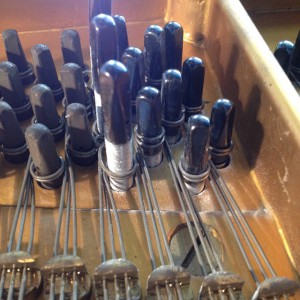What Does a Piano Tuner Actually Do?

Professional piano tuning is essential for your piano
Piano tuners are employed to make sure your instrument is always pitch perfect, helping you get more from your lessons and recitals. The actual role of ‘piano tuner’ is far more complicated than just altering the strings, though. It’s an incredibly skilled job, with many piano tuners having been in the job all their lives.
A piano tuner travels from location to location, tuning old and new instruments using both specialist equipment and an exquisitely toned ear. At the end of a job, the piano will have perfect pitch and be ready to play to musical supremacy.
What does a piano tuner do?
There are 88 keys and around 220 strings on a standard piano. It’s the piano tuner’s job to tighten or loosen each string and then test each one until the sound matches perfect pitch, as it would sound with a tuning fork. This is where having an excellent ear is essential.
In modern times, the piano tuner may use an electronic tuning device. But being able to tune by ear is the real skill of an experienced practitioner.
A piano tuner can also recognise anything up to 10,000 different parts that make a piano. They know what the role of each part is, where it should be placed in the piano and what it actually does. And they can spot a fault with any piece, if one exists, and will also carry out repairs. Spotting internal problems, such as broken hammers, is critical, and they may also work on major repairs such as replacing the wires or fixing broken casings.
How to prepare for a tuning
The most important thing to do in preparation for a tuning is to have enough time set aside for the tuner to come and do their job. It isn’t something that can be rushed, so ensure you don’t need the piano that day.
The piano should be cleared of music, books and clutter. Remove anything on the top, such as ornaments or lamps. This will help get the appointment off to a speedy start. Leave the stool or bench in place so the tuner can sit as they work.
The household should be asked to keep noise to a minimum while the tuning is carried out.
How to keep your piano in tune
The cornerstone of a piano is frequent tuning and care. Between tunings, try to avoid moving the piano, as the positions of parts such as the bridge pins and the tuning pins are sensitive. If there are any shocks or impact, this can lead to the piano being out of tune when it reaches the new location.
The piano should be kept in an environment where there are no extremes in temperature or humidity. Too hot and strings stretch, too cold and they tighten; this can make the piano play too flat or too sharp. Avoid doors, windows, humidity an steam, too.
What to do if you need your piano tuning
A piano should always be tuned by a skilled and qualified professional. It’s not something that can be done by an amateur, since a piano is a sensitive and complicated instrument. We have tuners based at Piano Workshop in Reigate who can help with your tuning needs. If your piano needs attention, contact us to set up an appointment.

